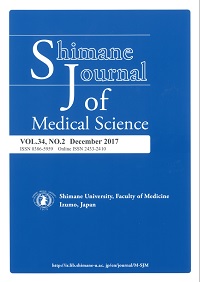Shimane University Faculty of Medicine
ISSN :0386-5959(冊子体)
ISSN :2433-2410(オンライン)


これらの論文は クリエイティブ・コモンズ 表示 - 非営利 - 改変禁止 4.0 国際 ライセンスの下に提供されています。
ダウンロード数 : ? 件
この文献の参照には次のURLをご利用ください : https://ir.lib.shimane-u.ac.jp/49612
Shimane Journal of Medical Science 37 1
2020-03 発行
Childhood Thyroid Examinations in the Kanto Hotspot: A Report(Study Period: October 2013 to December 2017)
野宗 義博
Department of General Medicine, Shimane University Faculty of Medicine, Izumo, 693-8501, Japan
TAKEICHI, Nobuo
Department of General Medicine, Shimane University Faculty of Medicine, Izumo, 693-8501, Japan / Takeichi Clinic, Hiroshima, 732-0806, Japan / Hiroshima University, Research Institute for Radiation Biology and Medicine, Hiroshima, 734-8553, Japan
木島 庸貴
Department of General Medicine, Shimane University Faculty of Medicine, Izumo, 693-8501, Japan
YANAGISAWA, Yuko
Funabashi Futawa Hospital, Funabashi, 274-0805, Japan
USHIYAMA, Motomi
Sagami Seikyo Hospital, Sagamihara, 252-0303, Japan
SAWADA, Takashi
Minatomachi Clinic, Yokohama, 221-0056, Japan
OISHI TANAKA, Yumiko
Department of Radiology, Tsukuba University, Tsukuba, 305-8575, Japan
EGUCHI, Nobuko
Hitachinaka General Hospital, Hitachinaka, 312-0057, Japan
NISHIO, Masamichi
Hokkaido Cancer Center, Sapporo, 003-0804, Japan
OISHI, Mitsunobu
Co-op Jyoso, Moriya, 302-0109, Japan
石橋 豊
Department of General Medicine, Shimane University Faculty of Medicine, Izumo, 693-8501, Japan
INOUE, Ken
Department of Public Health, Gunma University Graduate School of Medicine, Maebashi, 371-8511, Japan
HOSHI, Masaharu
Hiroshima University, Research Institute for Radiation Biology and Medicine, Hiroshima, 734-8553, Japan
内容記述(抄録等)
Similar to that in the Chernobyl nuclear accident, the occurrence of thyroid cancer in children was also feared following the Fukushima nuclear in Japan. Thyroid examination of children residing in the Fukushima Prefecture was performed quickly and nearly 200 cases or suspected cases of thyroid cancer have been reported. However, the thyroid glands of children evacuated from Fukushima and the hotspot area of Kanto have not been screened. Therefore, in response to requests from mothers outside Fukushima Prefecture, we started ultrasound examinations of the thyroid glands of children in October 2013. Since then, examinations have been performed annually until now. This report describes the results of these examinations performed through December 2017. The judgment standards for ultrasound examination of the thyroid gland were as indicated by Fukushima Prefectural University. Briefly, A1 judgment: without nodules or cysts, A2 judgment: with nodules measuring 5.0 mm or less or cysts measuring 20.0 mm or less, B judgment: nodules measuring 5.1 mm or more or cysts measuring 20.1 mm or more, and C judgment: requiring immediate secondary examination. Ultrasound examinations of the thyroid gland were conducted in the presence of family members and parents; in order to correctly convey the findings to the family, the findings were explained while viewing the images on the spot. Thyroid screening was conducted for residents of the Kanto hotspot for four years and a total of 8,171 people were examined. A1, A2, B, and C judgments were observed in 2,089 (25.6%), 5,969 (73.1%), 106 (1.3%), and 7 persons (0.1%), respectively. Nodules were noted in 226 patients (2.77%). At the time of the nuclear accident, pediatric thyroid ultrasonography was performed in a total of 7,693 children under 18 years of age. A1, A2, B, and C judgments were observed in 1,922 (25%), 5,735 (74.5%), B 34 (0.4%), and C two people (0.29%), respectively, and nodules were observed in 125 people (1.62%). The thyroid examinations were conducted annually by traveling through the hotspot. The number of A2 judgments increased each year, while the number of B judgments did not increase. There was also no increase in the number of C judgments. The results of screening in the Kanto hotspot area revealed that, contrary to the expectation based on reports after the Chernobyl nuclear accident, the frequent occurrence of childhood thyroid cancer was not observed.
About This Article
権利関係
Faculty of Medicine, Shimane University
Other Article
PP. 13 - 20
